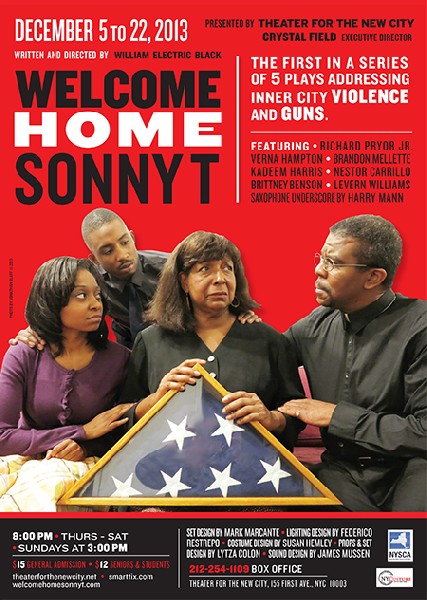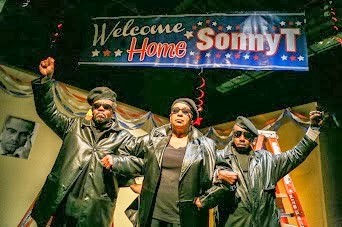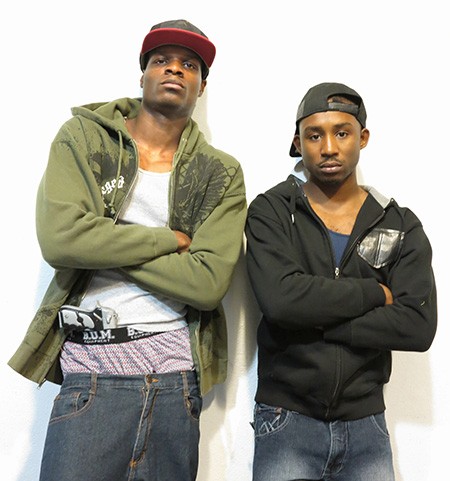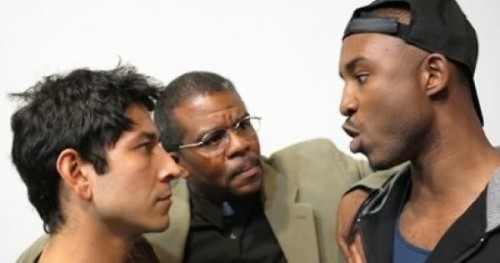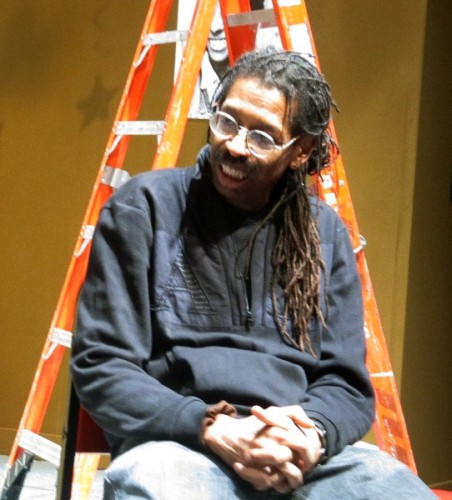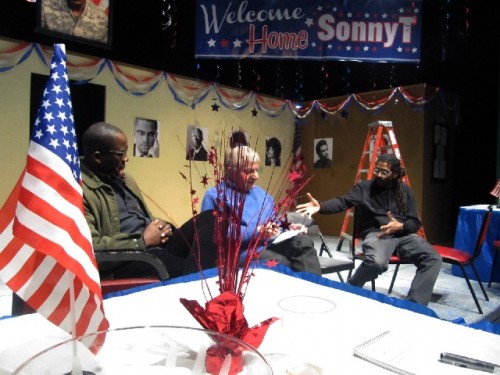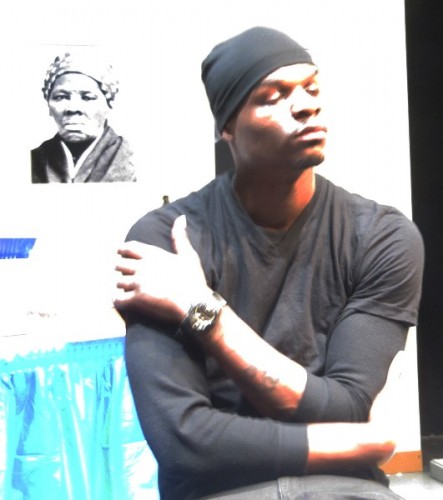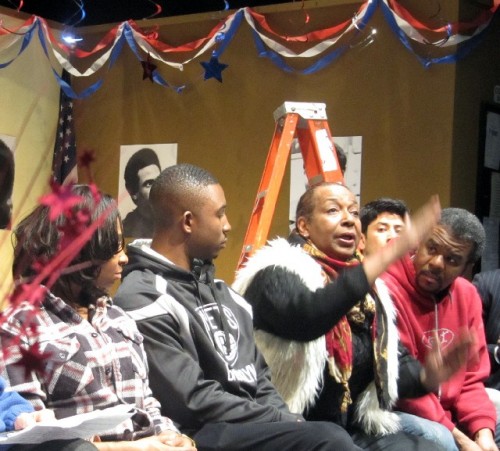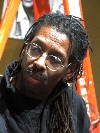Welcome Home Sonny T in New York Premiere
By Seven Time Emmy Winner William Electric Black
By: Charles Giuliano - Dec 17, 2013
Welcome Home Sonny T
Written and Directed by William Electric Black
Cast: Richard Pryor, Jr. (Reverend Miller), Levern Williams (Funkygood), Verna Hampton (May Walker), Brittney Benson (Lashon Walker), Nestor Carrillo (Carlos Mendez), Kadeem Ali Harris (Rodney Walker), Brandon Mellette (Big Boy)
Theatre for the New City
155 1st Avenue
NYC
212 254 1109
December 5 to 22, 2013
Welcome Home Sonny T by seven time Emmy Award winner, William Electric Black, having its premiere at New York’s Theatre for the New City, is intended as the first in a cycle of five plays focused on inner city violence and guns.
The Harriet Tubman Community Center on Staten Island is being decorated to celebrate the homecoming of Sonny T after a tour of duty in Afghanistan. With the help of Revered Miller (Richard Pryor, Jr.) he beat charges of complicity in a fatal shooting in the hood by enlisting.
The shooter, the brother of the angry and violent Big Boy (Brandon Mellette), has been doing time while his accomplice is about to be welcomed home as a hero.
Before the play began we contemplated the simple set with images of black leaders spaced around the walls: Frederick Douglass, Harriet Tubman, Martin Luther King, Jr., Malcolm X, Shirley Chisholm, Angela Davis, and Huey Newton.
As a prologue there is a vignette of three middle aged characters, two men and a woman, evoking the black power militancy of the Black Panthers in the 1960s.
Cut to the Reverend Miller in a radio booth speaking to the community about local events, the welcome home party for Sonny T, collecting food and canned goods for local Hurricane Sandy victims, and his now superannuated mantra of revolution.
It seems that back in the day, before he put down the gun to take up the collar, the Rev did things that, as the plot evolves, will come back to haunt him.
Today inner city kids pick up guns not to put a pop in the man but to cap each other into early graves. While the playwright, during a talk back with the audience following the performance, insisted that his play is about racial tension (in this fact based Staten Island context about blacks and Mexicans offing each other).
Inspired by those iconic images on the walls I thought it might be about the generational reality of how the revolutionary idealism of the 1960s has devolved into the pointless slaughter of kids killing kids. The play suggests that gun violence is a disease and epidemic. The post play discussion explored how to treat the plague.
There are some 200,000,000 guns in America. I appear to be in the minority of the unarmed.
As the middle aged hipster Funkygood (Levern Williams) with James Brown slips, swirls and slides states that back in his day “We settled things with our fists.”
Not any more.
The morning after this performance I read a New York Times article about Colorado Sheriffs who are united in refusing to enforce new state gun regulations. If that’s the Wild West try to fathom tight little Staten Island where young blood blacks and Mexicans are clashing and whacking over turf.
On a ladder a cheerful Lashon (Brittney Benson) is hanging streamers under a banner welcoming home her brother. Mom/ May (Verna Hampton) is frying up a mess of chicken for the party. Brother Rodney (Kadeem Ali Harris) is up to no good hanging with the bad ass Big Boy who is looking to pop another “rice and beans” Mexican.
Enter Carlos (Nestor Carrillo) a leader of Mexican youth who is bringing a food donation to the center. We learn that his brother was shot the week before (by Big Boy) and he plans to head a protest march that night.
The conflict is that it will pass by the community center during the welcome home party. To Funkygood that spells trouble. Carlos challenges the Reverend to join the demonstration and speak out for unity. This evokes a beef between Carlos and Rodney.
It seems that Big Boy has given Rodney a piece and wants him to use it that night against the Mexicans, or else.
While this is a diamond in the rough production, with uneven performances, the play itself is well crafted and compelling. It brought tears to my critic friend and put a lump in my throat as well.
Although Electric won all those Emmys for family and kids shows like Sesame Street here he shows real chops for grown up stuff. This is a play that deserves serious critical attention and a shot at regional and Equity theatre.
While Pryor, the son of the great comedian, is the marquee name in this production, unfortunately, he is also its weakest link. Too often he stumbled over lines that were delivered without the conviction they deserve.
Williams had some nice moves and nostalgic riffs as Funkygood. Hampton was rock solid as the grief stricken mother.
The heart and soul of this play, its blood sweat and tears, however, belonged to the kids.
Mellette and Harris really lashed into each other with white hot ferocity. Mellette in particular was towering and menacing, the very embodiment of lost youth, on a fast track to nowhere. His street smarts were scary in their letter perfect veracity. Keep an eye on this kid.
For a young actress Benson was well nuanced in conveying a broad sweep of mood changes from the joy of welcoming home her brother to the terrible loss that ensues. She was convincing in standing up to the menacing and terrifying irrationality of Big Boy.
The character and performance of the catalyst Carlos needs work. He is a bit too good to be true. It is hard to imagine walking into the camp of the enemy with a donation of canned goods. Then he doesn’t react with any conviction when confronted. He’s a bit too Mother Teresa for an embattled immigrant.
Yes, I know that this play was about Gangs of New York (from Five Points to Staten Island) but what the fuck happened to the revolution?
The images on the wall evoked Dr. King/ Mandela and non violence vs. Malcolm’s “By any means necessary” or Angela/ Huey and the Panthers.
My generation, like the Rev. and Funkygood, perhaps even Electric, believed in something. But kids today? Killing for what?
Perhaps over the next four plays these are issues and themes that William Electric Black will delve into. Like this play, hopefully, they will be high voltage, scorching performances that will knock our socks off.
Link to ABC TV7 coverage.

